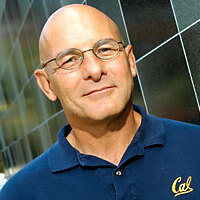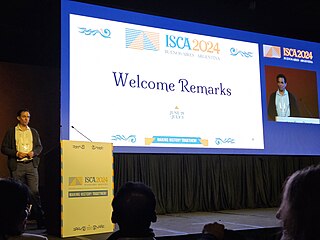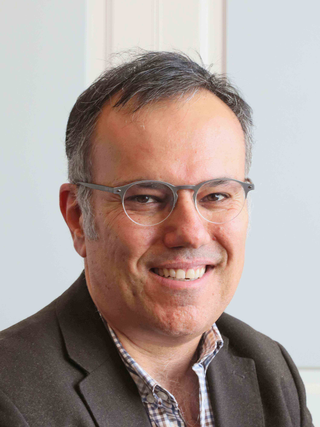Related Research Articles
The Association for Computing Machinery (ACM) is a US-based international learned society for computing. It was founded in 1947 and is the world's largest scientific and educational computing society. The ACM is a non-profit professional membership group, reporting nearly 110,000 student and professional members as of 2022. Its headquarters are in New York City.

David Andrew Patterson is an American computer scientist and academic who has held the position of professor of computer science at the University of California, Berkeley since 1976. He is a computer pioneer. He announced retirement in 2016 after serving nearly forty years, becoming a distinguished software engineer at Google. He currently is vice chair of the board of directors of the RISC-V Foundation, and the Pardee Professor of Computer Science, Emeritus at UC Berkeley.
Randy Howard Katz is an American computer scientist. He is a distinguished professor emeritus at University of California, Berkeley of the electrical engineering and computer science department.
Maurice Peter Herlihy is an American computer scientist active in the field of multiprocessor synchronization. Herlihy has contributed to areas including theoretical foundations of wait-free synchronization, linearizable data structures, applications of combinatorial topology to distributed computing, as well as hardware and software transactional memory. He is the An Wang Professor of Computer Science at Brown University, where he has been a member of the faculty since 1994.

The International Symposium on Computer Architecture (ISCA) is an annual academic conference on computer architecture, generally viewed as the top-tier in the field. Association for Computing Machinery's Special Interest Group on Computer Architecture and Institute of Electrical and Electronics Engineers Computer Society are technical sponsors.
Hari Balakrishnan is the Fujitsu Professor of Computer Science and Artificial Intelligence in the Department of Electrical Engineering and Computer Science at MIT, and the Co-founder and CTO at Cambridge Mobile Telematics.
Lin Zhong is a Chinese American computer scientist. He is currently a Professor of Computer Science with Yale University. He received his B.S and M.S. in electronic engineering from Tsinghua University and Ph.D. in electrical engineering from Princeton University. From 2005 to 2019, he was with Rice University. At Yale, he leads the Efficient Computing Lab to make computing, communication, and interfacing more efficient and effective. He and his students received the best paper awards from ACM MobileHCI, IEEE PerCom, IEEE QCE, ACM MobiSys (3), and ACM ASPLOS. He is a recipient of the NSF CAREER Award, the Duncan Award from Rice University, the RockStar Award (2014) and Test of Time Award (2022) from ACM SIGMOBILE. He is a Fellow of IEEE and ACM.

Victor Bahl is an American Technical Fellow and CTO of Azure for Operators at Microsoft. He started networking research at Microsoft. He is known for his research contributions to white space radio data networks, radio signal-strength based indoor positioning systems, multi-radio wireless systems, wireless network virtualization, edge computing, and for bringing wireless links into the datacenter. He is also known for his leadership of the mobile computing community as the co-founder of the ACM Special Interest Group on Mobility of Systems, Users, Data, and Computing (SIGMOBILE). He is the founder of international conference on Mobile Systems, Applications, and Services Conference (MobiSys), and the founder of ACM Mobile Computing and Communications Review, a quarterly scientific journal that publishes peer-reviewed technical papers, opinion columns, and news stories related to wireless communications and mobility. Bahl has received important awards; delivered dozens of keynotes and plenary talks at conferences and workshops; delivered over six dozen distinguished seminars at universities; written over hundred papers with more than 65,000 citations and awarded over 100 US and international patents. He is a Fellow of the Association for Computing Machinery, IEEE, and American Association for the Advancement of Science.
Maria Gini is an Italian and American Computer Scientist in artificial intelligence and robotics. She has considerable service to the computer science artificial intelligence community and for broadening participation in computing. She was Chair of the ACM Special Interest Group in Artificial Intelligence SIGAI from 2003 to 2010. She is currently a member of the CRA-W board.
Edward W. Knightly is an American professor and the department chair of Electrical and Computer Engineering at Rice University in Houston, Texas. He joined the Rice University faculty in 1996. He heads the Rice Networks Group.
Venkata Narayana Padmanabhan is a computer scientist and principal researcher at Microsoft Research India. He is known for his research in networked and mobile systems. He is an elected fellow of the Indian National Academy of Engineering, Institute of Electrical and Electronics Engineers and the Association for Computing Machinery. The Council of Scientific and Industrial Research, the apex agency of the Government of India for scientific research, awarded him the Shanti Swarup Bhatnagar Prize for Science and Technology, one of the highest Indian science awards for his contributions to Engineering Sciences in 2016.
Kevin Skadron is an American computer scientist, the Harry Douglas Forsyth Professor of Computer Science. He served as department chair and served as Director of the SRC JUMP Center for Research on Intelligent Storage and Processing in Memory (CRISP), and the Center for Automata Processing (CAP), at the University of Virginia, Charlottesville, Virginia. His research focuses on computer processor design under physical constraints such as temperature, power, and reliability. He and his colleagues have contributed numerous tools now widely used in the research community, including the HotSpot family of tools and the Rodinia Benchmark Suite. Skadron also helped co-found IEEE Computer Architecture Letters and served as editor-in-chief from 2010 to 2012.

Babak Falsafi is a Swiss computer scientist specializing in computer architecture and digital platform design. He is the founding director of EcoCloud at EPFL, an industrial/academic consortium investigating efficient and intelligent data-centric technologies. He is a professor in the School of Computer and Communication Sciences at EPFL. Prior to that he was a professor of electrical and computer engineering at Carnegie Mellon University, and an assistant professor of electrical and computer engineering at Purdue University. He holds a bachelor's degree in computer science, a bachelor's degree in electrical and computer engineering with distinctions from SUNY Buffalo, and a master's degree and PhD in computer science from University Wisconsin - Madison.

ACM SIGARCH is the Association for Computing Machinery's Special Interest Group on computer architecture, a community of computer professionals and students from academia and industry involved in research and professional practice related to computer architecture and design. The organization sponsors many prestigious international conferences in this area, including the International Symposium on Computer Architecture (ISCA), recognized as the top conference in this area since 1975. Together with IEEE Computer Society's Technical Committee on Computer Architecture (TCCA), it is one of the two main professional organizations for people working in computer architecture.
The Association for Computing Machinery SIGARCH Alan D. Berenbaum Distinguished Service Award is given for outstanding service in the field of computer architecture and design.

Marie desJardins is an American computer scientist, known for her research on artificial intelligence and computer science education. She is also active in broadening participation in computing.

Roy Want is a computer scientist born in London, United Kingdom in 1961. He received his PhD from Cambridge University (UK) in 1988 for his work on multimedia Distributed Systems; and is known for his work on indoor positioning, mobile and ubiquitous computing, automatic identification and the Internet of Things (IoT). He lives in Silicon Valley, California, and has authored or co-authored over 150 papers and articles on mobile systems, and holds 100+ patents. In 2011 he joined Google as a senior research scientist, and is in the Android group. Previous roles include senior principal engineer at Intel, and principal scientist at Xerox PARC...
Trevor Mudge is a computer scientist, academic and researcher. He is the Bredt Family Chair of Computer Science and Engineering, and Professor of Electrical Engineering and Computer Science at the University of Michigan.
Andrew Thomas Campbell is a computer scientist who works in the field of ubiquitous computing. He is best known for his research on mobile sensing, applied machine learning, mental health and human behavioral modeling.
Mi Zhang is a computer scientist at Ohio State University, where he is an Associate Professor of Computer Science and Engineering and the director of AIoT and Machine Learning Systems Lab. He is best known for his work in Edge AI, Artificial Intelligence of Things (AIoT), machine learning systems, and mobile health.
References
- ↑ "Analyzing and tuning memory performance in sequential and parallel programs - ProQuest". www.proquest.com. Retrieved 2024-11-19.
- ↑ "Margaret Martonosi". www.princeton.edu. Retrieved 2020-05-11.
- ↑ "Margaret Martonosi". Program for Andrew Dickson White Professors-at-Large. 2019. Retrieved 2019-03-12.
- ↑ "NSF selects Margaret Martonosi to head Computer and Information Science and Engineering Directorate". www.nsf.gov. 2019. Retrieved 2019-09-26.
- 1 2 "Margaret Martonosi of Princeton University receives ACM Frances E. Allen Award for Outstanding Mentoring". www.acm.org. Retrieved 2024-05-29.
- ↑ David Brooks. "Wattch Downloads" . Retrieved 2013-07-26.
- ↑ David Brooks; Vivek Tiwari & Margaret Martonosi (2000). "Wattch: a framework for architectural-level power analysis and optimizations". 27th Annual International Symposium on Computer Architecture (ISCA '00).: 83–94.
- ↑ Isci, Canturk; Contreras, Gilberto; Martonosi, Margaret (2006). "Live, Runtime Phase Monitoring and Prediction on Real Systems with Application to Dynamic Power Management". 2006 39th Annual IEEE/ACM International Symposium on Microarchitecture (MICRO'06). pp. 359–370. CiteSeerX 10.1.1.482.6263 . doi:10.1109/MICRO.2006.30. ISBN 978-0-7695-2732-1. S2CID 11446836.
- ↑ James Donald & Margaret Martonosi (2006). "Techniques for Multicore Thermal Management: Classification and New Exploration". ACM Sigarch Computer Architecture News. 34 (2): 78–88. doi:10.1145/1150019.1136493. S2CID 2951095.
- 1 2 Qiang Wu; Martonosi, M.; Clark, D.W.; Reddi, V.J.; Connors, D.; Youfeng Wu; Jin Lee; Brooks, D. (2005). "A Dynamic Compilation Framework for Controlling Microprocessor Energy and Performance". 38th Annual IEEE/ACM International Symposium on Microarchitecture (MICRO'05). pp. 271–282. doi:10.1109/MICRO.2005.7. ISBN 978-0-7695-2440-5. S2CID 9461661.
- ↑ Isci, Canturk; Buyuktosunoglu, Alper; Cher, Chen-Yong; Bose, Pradip; Martonosi, Margaret (2006). "An Analysis of Efficient Multi-Core Global Power Management Policies: Maximizing Performance for a Given Power Budget". 2006 39th Annual IEEE/ACM International Symposium on Microarchitecture (MICRO'06). pp. 347–358. CiteSeerX 10.1.1.572.6592 . doi:10.1109/MICRO.2006.8. ISBN 978-0-7695-2732-1. S2CID 3133392.
- ↑ Elizabeth Landau. "Endangered zebra life caught on GPS" . Retrieved 2013-07-26.
- ↑ Philo Juang; Hidekazu Oki; Yong Wang; Margaret Martonosi; Li Shiuan Peh & Daniel Rubenstein. (2002). "Energy-efficient computing for wildlife tracking: design tradeoffs and early experiences with ZebraNet". 10th International Conference on Architectural Support for Programming Languages and Operating Systems (ASPLOS X).: 96–107.
- ↑ Ting Liu; Christopher Sadler; Pei Zhang & Margaret Martonosi (2004). "Implementing software on resource-constrained mobile sensors". Proceedings of the 2nd international conference on Mobile systems, applications, and services. pp. 256–269. doi:10.1145/990064.990095. ISBN 978-1581137934. S2CID 3814716.
- ↑ Pei Zhang; Christopher Sadler; Stephen Lyon & Margaret Martonosi (2004). "Hardware design experiences in ZebraNet". Proceedings of the 2nd international conference on Embedded networked sensor systems. pp. 227–238. CiteSeerX 10.1.1.59.1094 . doi:10.1145/1031495.1031522. ISBN 978-1581138795. S2CID 591496.
- ↑ R. Becker, R. C-A1ceres, K. Hanson, S. Isaacman, J. M. Loh, M. Martonosi, J. Rowland, S. Urbanek, A. Varshavsky, and C. Volinsky (2013). "Human Mobility Characterization from Cellular Network Data". Communications of the ACM. 56 (1): 74–82. doi:10.1145/2398356.2398375. S2CID 207199776.
{{cite journal}}: CS1 maint: multiple names: authors list (link) CS1 maint: numeric names: authors list (link) - 1 2 Emmanouil Koukoumidis, Li-Shiuan Peh & Margaret Martonosi (2011). "SignalGuru". Proceedings of the 9th international conference on Mobile systems, applications, and services. pp. 127–140. doi:10.1145/1999995.2000008. hdl:1721.1/72478. ISBN 9781450306430. S2CID 218451606.
- ↑ Association for Computing Machinery (2009-12-01). "ACM Names 47 Fellows for Innovations in Computing, Information Technology". Association for Computing Machinery. Archived from the original on 2017-02-13. Retrieved 2013-04-28.
- ↑ Institute of Electronics and Electrical Engineering (2010). "Fellow Class of 2010". Institute of Electrical and Electronics Engineering. Archived from the original on 2013-05-16. Retrieved 2013-04-28.
- ↑ "Martonosi Named Jefferson Science Fellow". Princeton University. 2015. Retrieved 2016-07-04.
- ↑ Brooks, David; Tiwari, Vivek; Martonosi, Margaret (May 2000). "Wattch: A framework for architectural-level power analysis and optimizations". Proceedings of the 27th annual international symposium on Computer architecture - ISCA '00. ACM. pp. 83–94. doi:10.1145/339647.339657. ISBN 9781581132328. S2CID 14134385 . Retrieved 4 June 2017– via ACM Digital Library.
- ↑ American Academy of Arts and Sciences (2020). "New 2020 Members Announced". American Academy of Arts and Sciences. Retrieved 2020-04-23.
- ↑ "National Academy of Engineering Elects 106 Members and 23 International Members". NAE. February 9, 2021. Retrieved 2021-02-10.
- ↑ "ACM News Release Leader in Power-Efficient Computer Architecture receives Eckert-Mauchly Award" (PDF). Association for Computing Machinery. June 7, 2021. Retrieved 2021-06-07.
- ↑ "Margaret Martonosi of Princeton University to Receive ACM Frances E. Allen Award for Outstanding Mentoring". Association for Computing Machinery. May 29, 2024. Retrieved 2024-05-29.
- ↑ Semiconductor Research Corporation. "Aristotle Award Presentation TECHCON 2019". www.src.org. Retrieved 2019-09-19.
- ↑ ACM SIGARCH (2011-07-08). "ACM SIGARCH Alan D. Berenbaum Distinguished Service Award, Past Winners". www.sigarch.org. Retrieved 2019-07-29.
- ↑ IEEE. "HPCA Test of Time Award". ieeetcca.org. Retrieved 2019-02-21.
- ↑ Princeton School of Engineering (2018-02-14). "Martonosi wins IEEE Technical Achievement Award". princeton.engineering.edu. Retrieved 2019-02-21.
- ↑ ACM SenSys. "ACM SenSys Test of Time Award 2017". sensys.acm.org. Retrieved 2019-02-21.
- ↑ SAC. "Margaret R. Martonosi Selected to Receive Marie R. Pistilli Women in EDA Achievement Award". dac.org. Retrieved 2015-05-15.
- ↑ Anita Borg Institute. "2013 ABIE Award Winners". gracehopper.org. Archived from the original on 2013-10-04. Retrieved 2013-10-04.
- ↑ NCWIT. "NCWIT Undergraduate Research Mentoring Award". NCWIT.org. Retrieved 2013-05-28.
- ↑ ACM SIGMOBILE (2011). "MobiSys 2011 Best Paper Awards". ACM SIGMOBILE. Retrieved 2013-04-28.